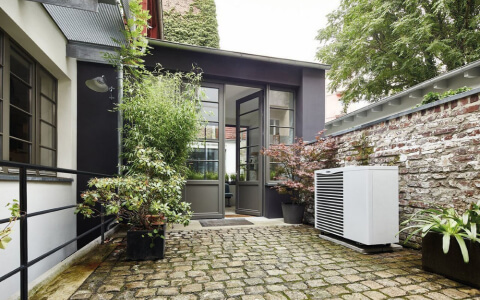Property: 4-bedroom detached domestic dwelling of 250 sqm
Technology: Air Source Heat Pump linked to Solar Panels
Location: Chichester, West Sussex, UK.
Many people think that heat pumps are ineffective in older buildings. However, this is not the case and their effectiveness is related to the system design, installation and clients use along with an understanding of the system. In fact, they are most effective when set-up correctly and then left alone.
At YFE we make sure that the customer understands the system before we leave the site and that they can contact us with any queries in the future.
In West Sussex, we designed and installed a solution for a customer living in a Grade II listed cottage in a conservation area who wanted to make the transition from oil to renewable technologies.
Moving from oil
Our customer lived in a small village which has had gas installed in the last five years. Within their property, they were not connected to the gas supply and were using an eight-year-old oil boiler. This involved regular oil deliveries to the property, which was causing problems with access from the village.
While the oil boiler is likely to have continued to function for another eight to ten years, the customer was aware that the issues around delivery were likely to become more difficult and asked us to review alternative energy options for them.
We reviewed a number of different technology options, carrying out a detailed room-by-room heat loss calculation and system design in order to consider all viable options available for the property and the location. The options included a mains gas boiler (requiring connection to the village supply point) a Ground Source Heat Pump, a Biomass Boiler and an Air Source Heat Pump.
Choosing the right technology
Each of the options presented different challenges. Connecting to the village’s gas supply and installing a gas boiler offered only a short-term solution, given proposals to stop the installation of gas boilers from 2025 whilst a Ground Source Heat Pump required drilling but the property did not allow for access with a 12-tonne drilling rig to do so. Deliveries of pellets for a biomass boiler system would prove as challenging as the oil deliveries. Being located in a conservation area and being a listed property, meaning that all options required full planning permission from the local authority.
We decided that the most suitable option for this property was an Air Source Heat Pump.
Installation challenges
With the walled garden of the property also having Grade II listed status, the installation involved a diverse range of organisation, to meet the planning requirements and ensure that the garden was returned to its pre-installation state.
We worked with planners at Arun District Council, local landscape/garden contractors who understood the soil and the nature of groundwork’s, as well as involving the local MP and adhering to conservation area regulations.
The installation involved using a mini digger to dig 30 metres of trenching under the listed wall to install pre-insulated heat main pipework to the heat pump. A patio was also removed in order to install the pre-insulated pipework into the property and a concrete base was constructed outside of the walled garden for the heat pump to be sited on, prior to everything being reinstated.
The Air Source Heat Pump installation was made by Global Energy Systems, a British manufacturer who design and build Air Source Heat Pumps specifically for the UK climate in order to maximise system performance in a typical UK climate range, as opposed to other globally produced pumps, which are not.
We appointed one of our accredited, local installers to work on this project. For extra peace of mind, Global Energy also signed off on the system on completion. In addition, we have remote access to the system and can advise if any changes need to be made in the future.
A new system brings benefits
The customer already had solar panels installed. As part of the project, we linked the panels with the heat pump to enable them to assist in powering the heat pump.
The customer is expected to save £900 per year on annual fuel while the Renewable Heating Incentive Scheme (RHI) provided £1,500 towards the project cost (index-linked for seven years).
In addition, the customer no longer needs to organise oil deliveries, meaning the lorry is not coming through the village, contributing to a further reduction in emissions.
Testimonial
“Your Future Energy provided us with first-rate service from the initial site visit to the installation. The team reviewed a wide range of technologies to find the best solution for our energy needs, making a clear recommendation on both the energy source and the equipment itself. The installation team were friendly and very professional in what was a complex installation. YFE oversaw the final commission managing the project from start to finish. We have now transitioned from an oil system to an air source heat pump resulting in savings of more than £900 per year on our annual fuel costs. I have no hesitation in recommending David and his team”

